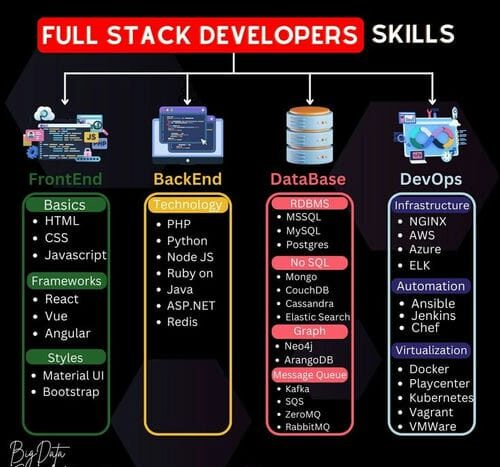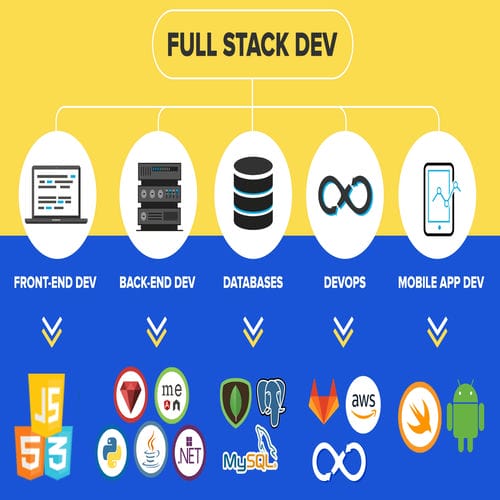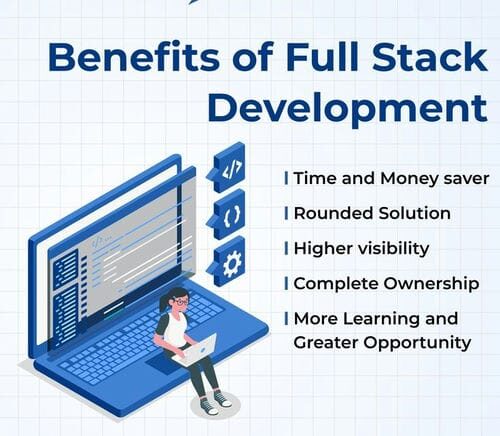Curious about what is .NET full stack developer? Let’s unravel the mystery together and explore the exciting world of full stack development. Have you ever wondered what makes a .NET full-stack developer important in today’s rapidly evolving tech industry? As you take a deep break within the realm of web development, the distinction lies in the capability to achieve the art of .NET full stack development. Do you know what is a.NET full-stack developer?
So, let’s dive into this extensive guide and explore all the wonders of .NET full stack development, the exciting skills, tools, and opportunities that lay ahead for those already in or those aspiring to become a part of this thrilling adventure. Whether you’re just beginning your front-end test journey or deep into taking your web app-to-next level after changing one line of code.
Join us on this epic journey to the heart of.NET full-stack development as we reveal the essential tools of the trade to create dynamic web applications and configurable web apps, all of which will ultimately change the world. We’d love to have you with us.
What is .NET Full Stack Developer?
Alright, let’s talk about .NET full stack developer. The phrase may be well-known to you from tech circles, but what exactly is it? Well, think of .NET as your toolbox for building awesome web applications. It’s a powerful framework developed by Microsoft that provides a wide range of tools and libraries for developers to work their magic.
1. History
A Bit of History .NET existed for a long, evolving and growing with each passing year. It started off as a Windows Centric Framework but has since extended its reach to include cross-platform development with the introduction of .NET Core, which later evolved into .NET 5 and beyond. This means you can now build applications that run on Windows, mac OS and Linux using the same set of tools and languages.
2. The Versatility of .NET
One of the best things about .NET is how versatile it is. It doesn’t matter if you’re putting together a simple website or a complicated enterprise application—or an app for mobile phones—.NET is easy to use. ASP.NET Core, Xamarin, and Entity Framework are all frameworks. That means you’ll have no trouble bringing your concepts and thoughts to reality.
Let’s do it! If the new possibilities of .NET open up or if you just want to learn more about the world of full-stack development. We’ll also discuss the abilities required to work as a full-stack developer for .NET and the amazing tools and technologies you can use.

Understanding Full Stack Development
1. Why Is Full Stack Development So Popular?
Have you ever thought about how a website or our favourite application is created? Full stack development makes it possible at all. Full stack development is most preferred. A full stack developer is one who can work with both front-end and back-end technologies to create full-fledged web applications entirely on their own. This leads to faster development, fewer dependencies, and faster revisions, which are all key components of the current tech sector.
2. Front-End vs. Back-End
You’re browsing an elegant, user-friendly website. The buttons click seamlessly, the animations are smooth, and the layout is pleasing to the eye. That’s the front-end—the part of the website that users interact with directly. On the flip side, the back-end is like the engine room of a ship, working behind the scenes to process requests, fetch data from databases, and ensure everything runs smoothly.
3. Why Versatility is Key?
Technology is always changing, and full stack developers are your secret weapon. It’s not enough to be skilled in one or a few areas. From creating beautiful and effective user interfaces with HTML and CSS to dealing with data from the server-side.
Are you wondering what is needed to become a .NET full stack developer? We delve into the fascinating domain of .NET development: the skills, the tools, and the numerous possibilities that lie ahead for you in this evolving industry.
Must Read:-
Core Skills of a .NET Full Stack Developer
1. Front-End Delicacy
As a .NET full stack developer, so your front-end skills are your bread and butter. You need to be a master of HTML, CSS, and JavaScript. These are the building blocks of every web application. However, it doesn’t stop there. We dive in to learn more about front-end frameworks such as Angular, React, or Vue.js-in addition to the many.
2. Back-End Brilliance
Everyone would say that front-end development is the most popular and crazy — let me tell you that the back-end is where the real magic begins. To be more precise, as a .NET full stack developer, you will become the master of server-side languages, whether it is C# or VB.NET. They will allow you to process data, authenticate and much more. And that’s not all; you will make a close familiarity of database management systems like SQL Server or MySQL and learn how to store and even bring data back.
3. The Power of Integration
Integration is everything in the realm of full stack development. You will have introduced the front-end and back-end components of your application to each other and ensured that data and information flow smoothly between them. Integration is simple with .NET by your side. Allowing you to create integrated and configurable applications with .NET, you can create restful APIs with ASP.NET Core or interact with databases using Entity Framework.
4. Embrace the Full Stack Lifestyle
Now that you have a general idea, what does it take to become a .NET full stack developer? The ideal situation is when you combine front-end finesse with back-end brilliance. If you have the right blend of skills and an appetite for learning, you should be able to make your way to being a full stack .NET master. Advanced tools and technologies will support your journey to becoming a full stack superhero.

Tools and Technologies Used
1. Gear Up with the Right Tools
A .NET full-stack developer needs the tools to get the job. Fortunately, the.NET development universe is overflowing with tools and technologies to aid you in creating awesome applications more quickly and efficiently.
2. IDEs
Your Command Center: Finally, your Integrated Development Environment (IDE) is the place where the magic happens. For .NET developers, an integrated development environment can set up and use Visual Studio as the baseline; an effective one, full-featured integrated development environment offers all the necessary tools to write, debug, and implement code quickly and effortlessly. However, you may prefer Visual Studio Code, which is a well-polished alternative, offers a simpler development environment, and supports a wide range of languages and frameworks.
3. Frameworks
Building Blocks of Success: They serve as the foundation for creating your application, so you don’t have to waste time or energy reinventing the wheel. And as a .NET software engineer, you get to work with a several different frameworks. For example, web applications using ASP .NET Core, desktop applications with the Windows Presentation Foundation, or even cross-platform development using Xamarin.
4. Version Control
Keep Your Code in Check: Version control is a lifesaver for developers. It enables you to see modifications to your code, work together with colleagues, and go back to a previous version if things go wrong. In the world of .NET, Git is the most popular version control program. It is distributed software that is incredibly adaptable and suited for user developers as well as large development teams.

Responsibilities of a .NET Full Stack Developer
1. Designing User-Friendly Interfaces
As a .NET full-stack developer, your task is to make user interfaces that are just as lovely and fun to use as they are. With the help of your front-end skills, you will make layouts, create reactive designs, and include the features that thrill visitors and keep them interested. It doesn’t matter whether you’re working on a lovely online store or a sophisticated business application; your UI skills will be tested.
2. Fixing Bugs
Are you a.NET full-stack developer? You’re like a superhero, swooping in from above whenever an awful bug need fixing or a new feature need to be implementing. You quickly set about transforming the website dreams into reality. Constructing a visually stunning user interface by obtaining data will never be boring and more people will engage on your website or application.
3. Building and Maintaining APIs
Modern web applications are held together by the glue of APIs (application programming interfaces). As a .NET full-stack developer, you’ll need to write, design, build, and maintain APIs to help your application’s different parts talk to each other. From exposing your data to third-party clients to integrating with external providers, it’ll be your API skills that make sure your app can talk and share data with others.
4. Database Design and Management
No web application can call itself complete without a powerful database for data storage and its recovery. As a .NET full stack developer, this is the language you will adopt before pursuing into DB design and management. That means starting from designing efficient database schemes and working with complex queries to writing stored procedures to guarantee that the data in your application is well organised and secured at the same time is easily accessible.
5. Implementing Security Measures
Security has never been as important as it is now with the rapid evolution of digitisation. As a .NET full stack developer, it will be your duty to ensure that you have put in place different security measures to safeguard your application from potential threats and unauthorised access. It would be your responsibility to ensure that everything is in place, from encoding sensitive data to the design and building of the user authentication and authorisation procedure.
6. Optimising Application Performance
In the world of web development, speed is critical. Whether you are a .NET full stack developer enhancing your application’s performance to achieve lightning-fast load times and responsive user experience, optimising database queries, automating code of one-time work, or using caching mechanism to helps reduce work by storing queries version of their results in memory. Your users will enjoy being on your page.
Advantages of Being a .NET Full Stack Developer
1. Seamless Integration with Microsoft Ecosystem
It’s likely that you are already a part of the Microsoft ecosystem. Being a .NET full stack developer, you have access to a fully-integrated suite of Microsoft’s tools and technologies while you’re a part of it. From Visual Studio for development to Azure for hosting and deployment, you can build, install and scale your applications with no problems.
2. Abundance of Resources and Community Support
One of the best aspects of being a .NET full-stack developer is the wealth of resources and support from the community available. No matter when you get stuck on a complicated bug or seek out the newest information on best practices, there is the right community of developers to assist you. There are numerous online forums and chat groups, as well as local meetups and conferences to be joined, and working with other developers is a superb way to strengthen your profession.
3. High Demand with Attractive Salary Prospects
In the tech world of today, skilled developers are in high demand and .NET full stack developers are no strangers to. There has never been a better time to be a .NET full stack developer, with businesses of all types and sizes hurrying to create and install web applications. It is a whole new world and .NET offers attractive salaries and a great atmosphere for growth. Giving .NET enthusiasts to dream big and discover more.

Career Path and Growth Opportunities
1. From Junior Developer to Tech Lead
Full stack developer .NET journey is similar to climbing a ladder, the higher you go, the more chances and more issues you will face. It starts with the junior full stack developer, which is an entry-level, and you have a chance to try many projects that are put in production or before. Going on from this level, you will achieve mid-level positions, such as .NET full stack develop, taking over mature projects and large projects.
2. Reaching New Heights
But it’s just the beginning. Through mastering your craft and broadening your understanding, you’ll gain access to such senior roles as a Technical Lead or Architect, inspire and support junior developers, influence the technical background of the projects, and head the work of teams. Considering the high need for a professional .NET full stack developer, it’s only up to you how far you wish to go and how many opportunities you’re ready to take.
3. The Future is Yours
Well, what does the future have in store for those who dream of becoming .NET full stack developers? Considering how quickly technology is developing and the increasing need for web applications, the sky really is the limit. Whether you want to develop state-of-the-art web applications, design creative solutions for everyday people, or influence the trajectory of the technology industry, a career in .NET full stack development promises endless avenues for personal and professional growth.
Conclusion
In conclusion, becoming a .NET full stack developer opens up a world of opportunities for those ready to set out on an exciting journey in the realm of web development. With the versatility of the .NET framework and the demand for skilled developers on the rise, there’s never been a better time to dive into this dynamic field. Whether you’re just starting out or looking to take your skills to the next level, the path to becoming a .NET full stack developer is filled with adventure, growth, and endless possibilities.
Whether you’re a beginner or an experienced developer, we’ve got everything you need to succeed in this fast-paced and ever-evolving industry.
Ready to kick-start your journey? Visit Devtrain.co today to explore our comprehensive courses and resources designed to help you master the art of .NET full stack development.


